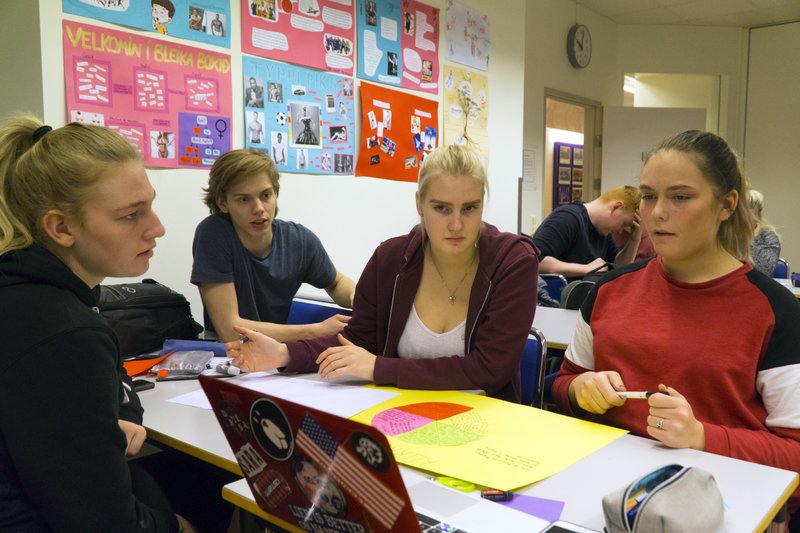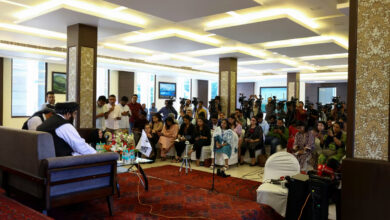
For nine years in a row, the World Economic Forum has ranked Iceland as having the world’s smallest gender-equality gap, and for about as long gender studies professor Gyda Margret Petursdottir has been asked how the Nordic island nation became such a paradise for women.
Her reply: “It isn’t.”
Iceland has a female prime minister and some of the world’s strongest laws on workplace equality and equal pay.
It also has one of Europe’s highest per-capita levels of reported rapes, according to statistics agency Eurostat, although legal definitions differ from country to country, complicating comparisons.
A 2010 University of Iceland study found that 30 percent of Icelandic women aged 18 to 80 reported having been physically attacked by a man at least once, including 13 percent who reported suffering rape or attempted rape.
Icelanders are experiencing a stark realization: Equal representation does not, by default, eliminate gender-based violence.
Petursdottir said the “myth” that Iceland’s record on gender equality makes it a safe haven for women is a distraction from the steps needed to fight systematic abuse.
“Men need to find ways to change their ideas about masculinity,” Petursdottir said. “That’s the biggest challenge now.”
The sexual misconduct allegations against powerful men in Hollywood, politics and beyond, and the “Me Too” campaign launched by women speaking out against abuse, have reached this volcanic island below the Arctic Circle.
Hundreds of women in Icelandic politics, entertainment and academia recently signed a pledge against sexual harassment and urged male colleagues to change their behavior.
More than 40 percent of lawmakers in Iceland’s parliament, the Althingi, are women. Last month left-wing leader Katrin Jakobsdottir became prime minister in a coalition government — Iceland’s second female leader in the last decade.
Her appointment is another point on the Global Gender Gap index for a country regarded as a champion of gender equality.
The index measures life expectancy, educational opportunities, political representation, equal pay and other factors — but not gender-based violence.
Feminists argue that Iceland’s star ranking masks continuing violence, harassment and everyday sexism — and that fixing the problem will need a transformation in the way men — and women — think and behave.
In a series of 137 anonymous accounts from women in politics recently published in local media, one female legislator illustrated everyday sexism with a story of a male opponent who complimented her looks right before she took the podium in an attempt to throw her off-topic.
Andres Ingi Jonsson, a lawmaker for the Left Green Movement, said the example shows how parliament, even more than other workplaces, risks becoming a harmful environment for women, since disarming opponents is a key part of politics.
“The basic tools we use can be influenced by sexually degrading language, and we need to remove that from the toolbox,” said Jonsson, who is among a group of male parliamentarians seeking to get men to become actively engaged in promoting gender equality.
The group successfully petitioned the speaker of parliament to host a workshop in February during which Iceland’s 63 legislators have been invited to openly discuss sexual harassment in the workplace.
“It won’t be an easy day,” Jonsson said.
He is optimistic that everyone will attend, even though some will approach the workshop with a more open mind than others.
“We have to be ready to open our hearts a bit,” Jonsson said.
Iceland may be far from perfect, but its politicians have taken gender equality seriously.
Icelandic law requires private companies to have at least 40 percent women on their boards and offers men parental leave equal to women. Starting next year, the Equal Pay Law will audit companies to prove that they are paying men and women the same for comparable work.
There are indications of a change in social attitudes and an unwillingness to turn a blind eye toward sexual harassment.
Iceland’s capital, Reykjavik, has a vibrant nightlife scene, and dozens of bars and clubs have tried to create a safer atmosphere by putting up posters urging guests to notify staff if they feel harassed.
Activist Helga Lind Mar said the scene has changed noticeably from a few years ago.
“We still have creeps,” she said, sitting by Reykjavik’s bar- and-restaurant-lined Laugavegur Street, famous for its long party nights. “But they are more afraid to be called out on their behavior.”
And educators have started to think about how to raise a generation of non-sexist adults.
At Reykjavik’s Borgarholtsskoli high school, teacher Hanna Bjorg Vilhjalmsdottir oversees lively discussions in her Introduction to Gender Studies class.
The aim of the class is to get young adults to notice everyday discrimination, stereotyping and harmful messages, she said.
When Vilhjalmsdottir, a pioneer of the concept, pitched the idea to school administrators 10 years ago “they were extremely skeptical,” she said. Now versions of the course are taught in 27 of Iceland’s 33 high schools.
Student Tinna Karen Victorsdottir said the course has changed her perception of life more than any other class.
She said she often brings class discussions to her family’s dinner table and shares course readings and videos with her parents. Over time, her parents have changed their behavior, too.
“My dad has taken on totally new house chores,” she said. “I guess it inspired him to see me this eager.”




